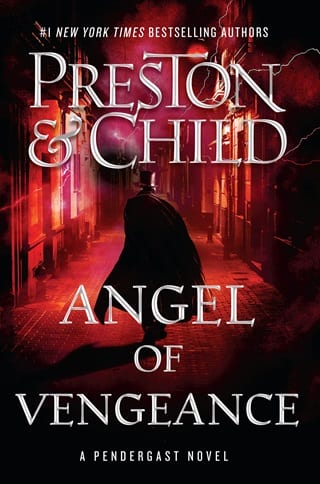30
30
C OMFORTABLE WITHIN THE RECESSES of his coach, curtains partially drawn, Murphy at the reins, Pendergast waited. They stood on the corner of Little Water Street and Anthony Street, as deep into the heart of the Five Points as Murphy would go, the horses wearing heavy blinders and their bits tight under the reins. Around the coach were decrepit tenements, with strings of laundry hanging over the street, itself piled with uncollected garbage and coal ash, prowled by emaciated cats and furtive, abandoned children. His gold watch was in his hand. Even though half past nine on a Monday morning was normally a relatively tranquil time in the slum, Pendergast's carriage might nevertheless have been overwhelmed by curious residents, save for the underground explosions that had occurred as they pulled up, exactly three minutes before.
" Jesus! " Murphy abruptly yelled. And then a moment later, as if finishing an equation, he added: " Mary and Joseph! "
Pendergast drew back the curtain and peered outside.
He had seen many incredible sights in his life, wondrous and terrible, ghastly and awe inspiring—but he had never seen anything quite like a cityscape becoming suddenly engulfed in rats. They poured out of every drain, every cellar hole, every ditch and manhole and crack and hollow: a streaming horde of wild, insane, gibbering rats, all tumbling over each other, biting and thrashing, accompanied by a deafening chorus of squealing and squeaking. Pendergast had never seen so many rats; he'd had no idea so many rats could exist in one place. They poured through the streets and alleyways, tributaries into rivers into deltas and then, at last, into a living ocean of brown and pink, frantically seeking escape or cover, streaming past and underneath the carriage, some trying to climb its wheels or scrabble up its slick, varnished sides. The entire floor of the city seemed to shudder and rock.
Despite their expert training, the horses began to prance and stamp in fear. Murphy wielded his whip, expertly flicking off one rat after another as they tried to climb aboard. " Sir! " he cried, a note of panic in his voice. "Sir, we better be moving on!"
"Stay just a bit longer, please. It will be over soon, I promise."
As the rats slowly began to thin out, a growing hiss could be heard over their shrieks—the sound of pressurized air being forced from the same holes, vents, and openings the rats had come, blowing out bits of trash and effluence with it. And then came an unfamiliar noise, but one Pendergast presumed was the hollow sound of water swilling in caves, coming from everywhere and nowhere at once.
The few people in the street had fled in terror at the invasion. Now, with a rhythmic sloshing, the sounds gradually died away until, ten minutes later, all had grown still once more. A most unusual silence fell on Little Water Street, now empty of both rats and people, the winter mists settling down again as if nothing had happened—only a sticky layer of short, matted, brownish-black hairs, clinging knee-high to every surface, to show where the flood of rats had passed.
"Thank you for indulging me, Murphy," said Pendergast, with a rap of his cane on the carriage roof. "You may drive on."
 Fullepub
Fullepub 



